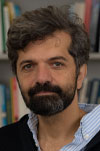Associate Researchers

Melissa Fisher, Professor
E-mail: msf4@nyu.edu
Melissa Fisher, a cultural anthropologist affiliated with New York Uni-
versity’s Institute for Public
Knowledge and the Conference Board,
contributes to the Global Foresight Project by examining
how workplace
futurists shape the design and experience of future workplaces in the
context of
pandemics. This research aims to understand the know-
ledge and cultural dynamics involved in
creating Covid and Post-Covid work environments, with
a focus on the potential for either promoting equity and justice or perpetuating hierarchies of class,
race, gender, and power. Fisher’s
study draws on four years of fieldwork with professionals in
facility management, corporate real
estate, and architectural think tanks and design consultancies
in Europe and the United States.
She
is also known for her expertise in organizational studies,
globalization, technology, and work,
as
showcased in her books Frontiers of Capital: Ethnographic
Reflections on the New Economy
(2006) and Wall Street Women (2012). Fisher’s ongoing research,
teaching experience, and active
involvement in gender-focused initiatives and advisory boards further
contribute to her distinguished
background in the field. She holds a Ph.D. and M.A. in Anthropology
from Columbia University.

Douglas R. Holmes, Professor
E-mail: dholmes@binghamton.edu
Central bankers hold a crucial role in the global monetary regime as they
not only manage but also
design the system. They have developed an
experimental policy framework to shape economic
behavior and influence
expectations about the future. This research focuses on the anthropological
settings of various central banks, including the Reserve Bank of New
Zealand, the Riksbank, the Bank
of England, the European Central Bank, and the Deutsche Bundesbank.
Douglas Holmes’s contribution
to the Global Foresight project aims to understand how central bankers
use language to create a discernable future that the public can reflect on and act upon, shaping our
tendencies to produce, consume,
borrow, and lend. Their goal is not to predict the future, but to
construct a manageable future through
the power of words, establishing a communicative dynamic
at the core of monetary affairs.

Afshin Mehrpouya, Professor
E-mail: afshin.mehrpouya@ed.ac.uk
Afshin Mehrpouya, professor in and chair in accounting at the University
of Edinburgh Business
School, has extensively researched the influence
of calculative knowledge, such as ratings and
rankings, in business regu-
lation. Recently, he has focused on the epistemic processes involved in
healthcare rankings. In the Global Foresight Project, Mehrpouya
con-
tributes by examining the role
of various calculative regimes in anticipation and regulatory
inter-
vention. His expertise in the sociology
of knowledge in global governance sheds light on the
pro-
duction, dissemination, adaptation, and
utilization of regulatory knowledge, as well as its relation-
ship with time and organizational management.

David A. Westbrook, Professor
E-mail: dwestbro@buffalo.edu
David A. Westbrook’s contribution to the Global Foresight project
explores the senses in which ‘the
future’ can stand in for teleology,
thus filling oft remarked lacunae in liberalism. He is also interested
in
how ostensibly participatory modes of projection can be used as tech-
niques of management and
even
coercion, rule by ostensible consensus.
Westbrook, Louis Del Cotto Professor at SUNY Buffalo
Law
School, thinks and writes about
the social and intellectual consequences of contemporary political
economy. His work influences
numerous disciplines, and he has spoken on six continents to academics,
business and financia
l leaders, members of the security community, civil institutions and governments,
often with the
sponsorship of the U.S. State Department. Among his many books and articles, perhaps
the most
relevant to this project are Navigators of the Contemporary: Why Ethnography Matters; Deploying
Ourselves: Islamist Violence and the Responsible Projection of US Force; and Out of Crisis:
Re-
thinking Our Financial Markets.
Photo credits: Danish Saroee (Mehrpouya)
